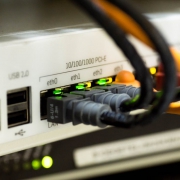In 4 Cybersecurity Tips for Small Businesses (Part 1), I previously shared about cybersecurity. It includes creating better passwords, setting restrictions, and so on. For this blog post, I will discussed more helpful tips for small businesses.
5. Plan for any Data Breach that May Happen
For this step, you may want to consult an IT staff. Perhaps, you may want to seek the advice of I.T. service providers like Omnipotech. Because cyber attacks keep increasing and increasing, it is recommended to prepare for the worst case scenario. For instance, backing up your data really helps in case data loss may happen.
6. Hack Your Own System
To check whether an outsider can easily get in your network, it is best to hire someone who look for these vulnerabilities and weaknesses. An IT consulting firms, like Omnipotech, can help you do a technical audit. now to audit your system in search of weaknesses. From there, you can think of better solutions or come up with better ways to connect with your clients.
7. Set Up a Firewall
The Federal Communications Commission (FCC) released a blog post called Cybersecurity for Small Business, and in that article, they specifically said,
A firewall is a set of related programs that prevent outsiders from accessing data on a private network.
The FCC recommends to all small businesses to create a firewall as a barrier between important company data and cybercriminals. Aside from having an external firewall, other companies also install internal firewalls to add another layer of protection.
8. Back Up Important Data
Yes, these to security measures prevent cyber attacks as possible, but there is no such thing as a perfect defense. You can still be breached regardless of extreme caution. The U.S. Small Business Administration reminds businesses to back up the data on all computers.
Important data include financial statements, invoice, spreadsheets, and other financial files. Do not forget to save word processing documents, databases, human resources files, and other company data. If possible, set up an automatic weekly back up, and store these files on another location. Keep it away from water and/or fire hazards.
9. Install Anti-Malware Software
Don’t leave it all to chance. It’s easy to say that your employees know what they are doing. They could have, unknowingly, opened phishing emails. Perhaps, they thought it was just another harmless email.
In fact, Verizon’s Data Breach Report indicated that 30 percent of employees admitted to opening phishing emails. Once these malicious emails are clicked, malware can quickly spread on the employee’s computer. Thus, it is extremely important to have anti-malware software.
If you can and if budget permits, install an anti-malware software on all devices using the company network. According to an article posted on Entrepreneur.com, phishing attacks go after certain employees. They target anyone who has access to confidential data from executives to human resources.
Conclusion
Cybersecurity should not be the last item on your security checklist. In fact, it should be the utmost priority of any business. Contact Omnipotech Support Center now to learn about the different cybersecurity solutions that you can add to protect your business.




